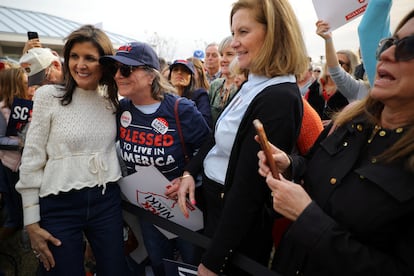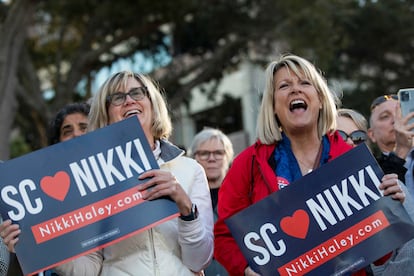Nikki Haley competes against Trump at home (and she has every chance of losing)
Polls predict a landslide victory for the former president in the South Carolina primary, the state where his last remaining Republican rival was born and served as governor


Nikki Haley is competing at home this Saturday, but she’s a long shot to win. Donald Trump’s only remaining rival in the race for the Republican nomination in the presidential election is like one of those mid-level teams about to play a game against the league’s dominant leader in front of their home fans. Barring a miracle, she has no way of winning the contest. The two politicians will go head-to-head in the South Carolina primary, the state where Haley was born and served as governor between 2011 and 2017, before she was Trump’s ambassador to the UN.
The candidate has been touring the southern state all week, basically repeating the same rally speech. One of the high points comes when she exclaims, “There were 14 men in this race; I have taken 12 ahead of me, I’m down to my last one.” In recent months, twelve party rivals have gone down in defeat, including Florida governor Ron DeSantis. But the last one is also the most difficult: ahead of this Saturday’s primary, Donald Trump leads her by almost 35 points, according to the polls.
If the forecasts are accurate, it will be the fourth primary that Trump takes without much effort, following the contests in Iowa, New Hampshire and Nevada. But Haley — who for months has had February 24 circled on her calendar as her big chance — warned on Tuesday that no matter the outcome, she does not plan to “go anywhere.” She will continue to fight; first, in Michigan, and then on March 5, Super Tuesday, the day when the largest number of states hold primary elections.
On Wednesday and Thursday, Haley traveled 310 miles and held two rallies a day, working hard for a handful of votes in North Augusta, one of those towns that got swallowed up by its own suburb, and in Myrtle Beach, a vacation town in the midst of the off-season, as well as in the wealthy ports of Beaufort and Georgetown. If there’s one thing these four places have in common, it’s how little they resemble Bamberg, the middle-of-nowhere town where Haley was born 52 years ago. Bamberg is a working-class community, decidedly Democratic and majority black (63.7%). The former is a rarity in South Carolina, which has voted Republican in the last 11 presidential elections. The latter, not so much: with 27.09%, it is the state with the fifth highest African American population in the Union. But it is a segment of the population that did not support her when she ran for governor. They won’t help her this time, either, given the candidate’s refusal to cite slavery as the cause of the Civil War in a televised appearance.
It was impossible to find a Haley supporter in Bamberg last Wednesday, but at least one neighbor remembered her. “She was friends with my daughter-in-law at school when she was in eighth grade. This is a small place, you know? We all know each other. My daughter-in-law speaks of her fondly,” recounted Jeff Deibel, who runs the local radio station; that day, he was taking pictures of the hole left in “a three-story building” by a tornado that ripped through the town of about 3,000 residents in January.
Childhood racism
Last week, Haley’s campaign bus (the “Beast of the Southeast,” she calls it) stopped here, and the candidate got to see the wreckage firsthand. “This is the town that taught me to be strong,” she told her former neighbors. In her memoirs (two to date), she recalls her years in Bamberg less fondly. She speaks of the racism she felt when Nimarata Randhawa had not yet changed her last name to her husband’s. Her family was the only one of Indian origin here and they were twice denied the sale of a house because of their ethnicity. She also remembers the time when she was eliminated from a beauty contest for “not being black or white.”
Like many who attend the challenger’s rallies these days, Deibel does not have high hopes for her victory. “Our system favors polarization and parties rather than people, so I don’t see much of a future for her,” he says. And like those supporters, he also believes that she was a good governor. So does Deborah Brooks, who, before the Augusta rally, recalled Haley’s “extraordinary and compassionate role when she kept the tragedy in Charleston from turning into a riot.” Brooks was referring to the 2015 killing of nine African Americans in a church by young white supremacist Dylann Roof, which led to another touchstone in Haley’s biography: that day she ordered the Confederate flag’s removal from the statehouse. Another of her voters, Monty Steedley, who supported Trump in 2016 and 2020, said that he saw her as the “only possible choice.” He does not want to hear about Joe Biden, more than likely the Democratic candidate, and he regards Trump as “too obsessed with himself”; Steedley’s hair still stands on end when he thinks of the attack on the Capitol: “What would have happened if he had the army on his side?” he wondered.

Both her service record as South Carolina governor and the calculation that she carries less baggage to defeating Biden are recurrent arguments in Haley’s speeches. She asserts that she lowered unemployment when she governed South Carolina and that she attracted companies such as Boeing and BMW. She blames Washington for everything and promises to bring Capitol Hill to heel. She has also attacked her rival for his advanced age, for increasing the public debt while he was president, for his sympathy with Vladimir Putin and for his attacks on veterans, an issue on which the candidate has decided to mention her personal life after months of avoiding it: she often states that her husband was stationed in Afghanistan and reminds attendees that Trump said that Americans who die in war are “losers” and “suckers.”
At her rallies, Haley also displays some of her contradictions. For example, she asserts that she would be the first woman in the White House but rejects the feminist rhetoric — unsuitable for her conservative base — of the “glass ceiling,” which Hillary Clinton almost broke. And the daughter of a professor who immigrated to Canada from India with eight dollars in his pocket advocates deportation as the only way out of the immigration crisis.
Her supporters, such as Bob Cook, at the Georgetown rally with his dog Wallen, to whom he holstered an I Pick Nikki T-shirt, see the living image of sanity in her battery of proposals; they trust that her campaign will, perhaps, win over undecided and independent voters, as well as bring about the “return of the traditional Republican Party’s essence.” Perhaps Cook hasn’t realized that such a party no longer exists.

Or maybe it is the fervor of the people who show up at each and every one of Haley’s campaign bus stops with displays of support for the former president. The one in Myrtle Beach was the most crowded and rowdiest recently. Leading the way was a guy named David Sandifer, who likes to dress up as Trump “to show his support.”
In addition to the blue suit, red tie and yellow wig, he showed up with the rest of the official MAGA kit: the hoax that the 2020 election was stolen from him, the certainty that the legal problems raised against him are politically motivated (Trump faces 91 felony charges in four separate cases), the warning that if he ends up in jail that could spark an “uprising,” and the theory that Haley is holding out because shadowy forces are funding her campaign in order to divide Republicans and pave the way for Biden’s re-election.
Beyond the conspiracy theories, Georgetown historian Michael Kazin believes that Haley’s persistence may be due to two motives: “the vain hope that one of Trump’s legal cases will turn his party’s voters against him,” or she is positioning herself as a candidate in the 2028 election. Others, like fellow Clemson University alumna Carie Mager, chalk it up to her “very, very stubborn” personality.
Or, who knows, maybe when she walks purposefully to the podium at one of her rallies she repeats South Carolina’s slogan to herself, a phrase that adorns the state’s license plates next to the palmetto tree: “As long as I breathe, there is still hope.”
Sign up for our weekly newsletter to get more English-language news coverage from EL PAÍS USA Edition
Tu suscripción se está usando en otro dispositivo
¿Quieres añadir otro usuario a tu suscripción?
Si continúas leyendo en este dispositivo, no se podrá leer en el otro.
FlechaTu suscripción se está usando en otro dispositivo y solo puedes acceder a EL PAÍS desde un dispositivo a la vez.
Si quieres compartir tu cuenta, cambia tu suscripción a la modalidad Premium, así podrás añadir otro usuario. Cada uno accederá con su propia cuenta de email, lo que os permitirá personalizar vuestra experiencia en EL PAÍS.
¿Tienes una suscripción de empresa? Accede aquí para contratar más cuentas.
En el caso de no saber quién está usando tu cuenta, te recomendamos cambiar tu contraseña aquí.
Si decides continuar compartiendo tu cuenta, este mensaje se mostrará en tu dispositivo y en el de la otra persona que está usando tu cuenta de forma indefinida, afectando a tu experiencia de lectura. Puedes consultar aquí los términos y condiciones de la suscripción digital.








































